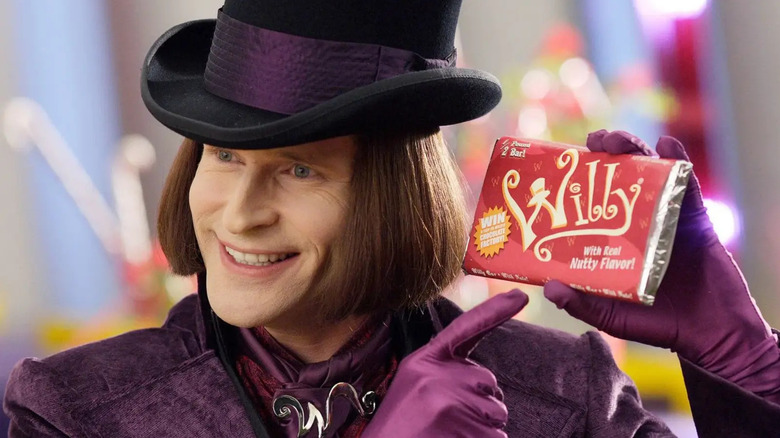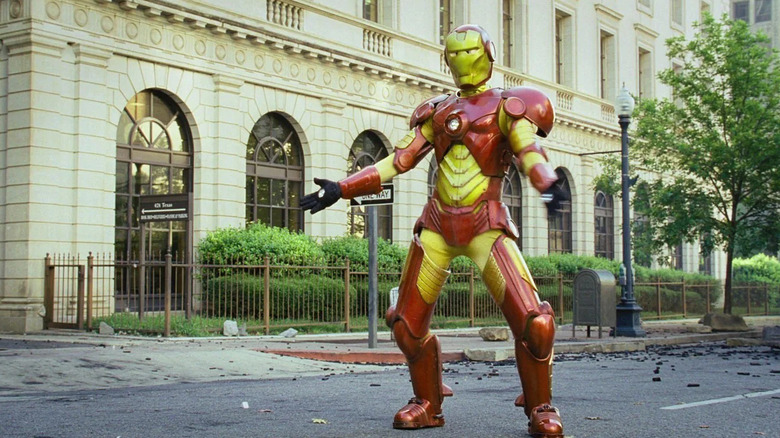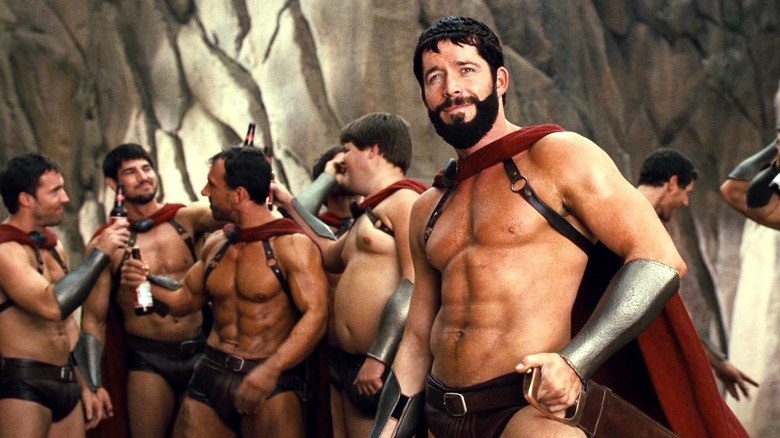The Worst Comedies Ever Made May Be Accidental Masterpieces
Throughout the '00s, audiences were repeatedly subjected to a long series of decreasingly funny and wholly execrable spoof "Movie" movies. The trend kicked off in 2000 with the release of Keenen Ivory Wayans' "Scary Movie," a spoof of "Scream" and all the other 1990s slasher films that were still in vogue at the time. "Scary Movie" added slapstick elements, underwear shots, stoner humor, gay panic jokes, and too many gags about semen and other bodily fluids. The film, however, made $278 million on a mere $19 million budget, so it was all but assured that sequels would come.
Over the decade, there were four sequels to "Scary Movie," with each one taking aim at the pop horror movies of the day, from "Saw" to "The Grudge" to "Signs" to the remake of "The Evil Dead." The movies didn't serve as winking criticisms of modern horror movie tropes, nor did they affectionately rib the weaknesses in a genre that the filmmakers loved. Instead, they served as repositories of references, hoping to elicit laughter or thrills from the very base act of recognition.
The makers of the "Scary Movie" movies would repeat a scene or borrow a character from a recent pop film, make them look a little cheaper, and then have them slip on a banana peel (or get hit by a car, or get killed by a falling cow). There was no commentary. There was just the shock of recognition, followed by a cheap sight gag.
Jason Friedberg and Aaron Seltzer were among the writers of "Scary Movie," and they rode that film's success into a whole subgenre of spoofs that remained frustratingly popular, despite being critically reviled. Their movies (which we'll get into below) were wildly hated, with an average 2.2% approval rating on Rotten Tomatoes. They are often considered the nadir of modern cinema.
But what if these terrible spoof movies are doing something secretly, unintentionally brilliant? What if, in a conceptual sense, they are distilling cinema down to its base chemicals?
The nadir of cinema
To reminisce: Jason Friedberg and Aaron Seltzer wrote and directed the films "Date Movie" (2006), "Epic Movie" (2007), "Disaster Movie" and "Meet the Spartans" (both 2008), and "Vampires Suck" (2010). Each one of these films, like "Scary Movie," made references to recent pop films, just regurgitated in a slapstick context. Each one also had gay panic jokes and crass sex jokes. They all contained at least one glory shot of a line of lithe models in bikinis. "Date Movie" was generally pointed at the romantic comedies of the day ("Meet the Parents," "Hitch," "The Wedding Planner," etc.), but the others were more of a general mishmash of everything that was hot in theaters. Friedberg and Seltzer even inspired imitators; "Superhero Movie," "Spanish Movie," "My Big Fat Independent Movie," and "Not Another Teen Movie" were also in the mix. That latter film, incidentally, actually had some wit to it, even if it was just as crass.
As comedies, these films all fail. There was seemingly no thought put into them. The filmmakers clearly weren't making any sort of commentary on the dominant paradigms of the day. There may be some integrity in thumbing one's nose at popular culture, but one cannot tell watching the "Movie" movies if the filmmakers love or hate the objects of their spoofery. They are neutral repeaters, immature lizard brains absorbing and repeating images and references without any context.
But then, that may be where the brilliance lies. Werner Herzog once said that cinemas were starved for new images. So many movies had been made, he felt, that anything truly novel was impossible. All we could do was repeat and remix images that had come before. The Friedberg/Seltzer comedies prove that. Indeed, they soundly reinforce that notion. There are no new images. The only thing that cinema can do, as Friedberg/Seltzer claim, is vomit back what we have already consumed.
Deconstructing cinema
What the Friedberg/Seltzer spoofs declare is that films are nothing more than the sum of their parts. They are, in a very literal sense, a series of images presented for consumption. It doesn't matter what the intentions of a filmmaker might be, or even if a film is good or bad. On a certain level, the film becomes little more than photographed images presented in a sequence. One only needs to dimly perceive a movie to absorb some of its images and slot them away in the back drawers of your brain's filing cabinet.
Jean-Luc Godard was, in his way, doing the same thing. Godard was keenly aware of the artificialities of the cinematic medium, saying that every edit in a movie is a lie, that every cut is a way to stray from the cinema's tendencies toward ecstatic truth. In his later works, Godard would seem to actively destroy cinema, kill its traditions, and make movies as swirlingly disorienting as possible. It's probably not a coincidence that Godard made his "Notre Musique" only two years before "Date Movie." 2010 — the same year as "Vampires Suck" — saw the release of Godard's aggressively avant-garde feature "Film Socialisme," and that film was also not very warmly received by critics. Sometimes, one can be too oblique. Sometimes, films can be boiled down too far.
And that is what the 2000s spoof movies did. It was clearly not intentional; Friedberg and Seltzer were not aiming to create deconstructionist works that dismantle the language of cinema through culture-jamming-like remixes. But they did achieve something revealing nonetheless. The movies are still assertively terrible, not to mention fat-phobic, homophobic, sex-phobic, sexist, and stupid, but perhaps they can serve a function. They are the shards of cinema's shattered mirror.


